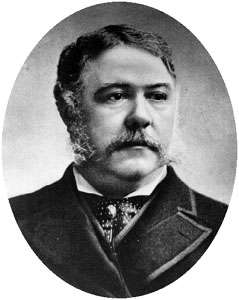Chester A. Arthur
(Not to be confused with The Presidents of the United States of America)
James A. Garfield ← Chester A. Arthur → Grover Cleveland

"I may be President of the United States, but my private life is nobody's damn business."—Chester A. Arthur
Chester A. Arthur was one of the most well-liked presidents of all time, a dapper, congenial schmoozer whom it was almost impossible to dislike. His critics, though, claimed that he accomplished nothing other than banquets and parties during his term.
There were rumors that he wasn't a natural-born American citizen, which would've made him ineligible for the presidency, but the people behind this rumor needed a couple of tries to come up with a plausible country of origin, so they weren't terribly credible. (Sounding familiar yet?) In reality there is a 99.948% probability he was born in Vermont.
His political career was largely a product of the New York political machine, and he was a close, personal friend of its boss, Roscoe Conkling. That Arthur went on to wage a war of reform against the patronage system is one of the lesser-known ironies of American history, but as Garfield was shot by a disgruntled office seeker after attempting similar reforms, he felt it was his duty. A friend was said to comment, "He's no longer Chet Arthur, but the president."
Most modern references to Chester A. Arthur focus not on his presidency, but on his rather spectacular set of mutton chops.
He upgraded the US Navy, which would then be used by William McKinley to wage the Spanish–American War. He also refused to move into the White House until it was renovated by Lewis Comfort Tiffany. Truman Capote may have had Breakfast at Tiffany's but Chet Arthur had Tiffany for breakfast.
His wife, Nell, died 20 months before he became president and he vowed never to re-marry. This didn't stop him from getting four marriage proposals on his last day in office, though.
Check out a one-minute biography here.
- The Charmer: Even his enemies had to admit that while they may not have liked his political positions, they couldn't really hate the person behind them.
- The Creon: Was seen as a perfect example of this up until he accepted the offer to be James A. Garfield's vice president, which put his major political patron's nose (Senator Roscoe Conkling) severely out of joint because it would have put Arthur higher than his own patron politically, but for reasons Arthur never explained, he stood his ground and accepted the nomination despite Conkling's objections.
- Hazy Feel Turn: Politically, he was a generally honest man but benefited from the corrupt politics of his day by incidence than by deliberate attempts to use them to his advantage, but he immediately supported civil service reform after becoming President, even though it would have destroyed the very political framework that had gotten him as far as it did prior, and his motives for such a shift are still not entirely understood even now.
- Hotblooded Sideburns: Had awesome muttonchops, but was known for being very non-confrontational and cordial.
- Incurable Cough of Death: He was actually slowly dying throughout his Presidential term, but it wasn't obvious he was a dying man until he left office. He suffered from what known then as Bright's disease, essentially the inability of the kidneys to flush the body of toxins in a timely manner, and it got worse as time went on, though he managed to make it through his presidency before it rendered him invalid.
- Irony: His entire political career prior to being President had been entirely beholden to having friends in high places and being a greaser of the wheels of party politics. As President, he then set about tearing down the walls of the same temple by refusing to continue the practice as President and helped make the 1883 Pendelton Civil Service Act law, which began the end of the patronage system that promoted one's friends into power over merit for position.
- Principles Zealot: Despite the fact he lived in an age of flexible ethics in politics, he flatly opposed the rejection of the 1875 Civil Rights Act by the Supreme Court, as he adamantly had rejected slavery and believed firmly in stronger civil rights, even when many Republicans had shed that idealism years before.
- He also opposed the Chinese Exclusion Act for similar reasons, but eventually relented and let it pass into law after it was obvious he'd lose the fight to stop it completely, though he did manage to knock a lot of it's harsher edge off before signing a revised version into law.
- So Okay It's Average: His entire presidential term was regarded as this both in his own time and in hindsight, as he didn't do anything major, but he didn't make any major mistakes and left the country generally as stable as he found it when he started office.
- Wild Card: As President, he befuddled not only Republicans, but also Democrats, because despite being a loyal Republican until becoming President, he often went against their wishes as President, either based on principle or because of an abrupt aversion to partisanship.
- The Woobie: He truly loved his wife Nell, to the point he swore to never re-marry after she died, and he had to throw himself back into politics lest dwelling on the grief overcame him.
Film
- Chester A. Arthur middle school is the site of the bomb plot in Die Hard With a Vengeance.
- The clue to this is "What is 21 out of 42?", there being 42 presidents at the time of writing.
Western Animation
- In The Simpsons episode "Lisa the Iconoclast", Lisa Simpson admits to suffering from "Chester A. Arthritis".
- Futurama: "Chester A. Arthur fall down."